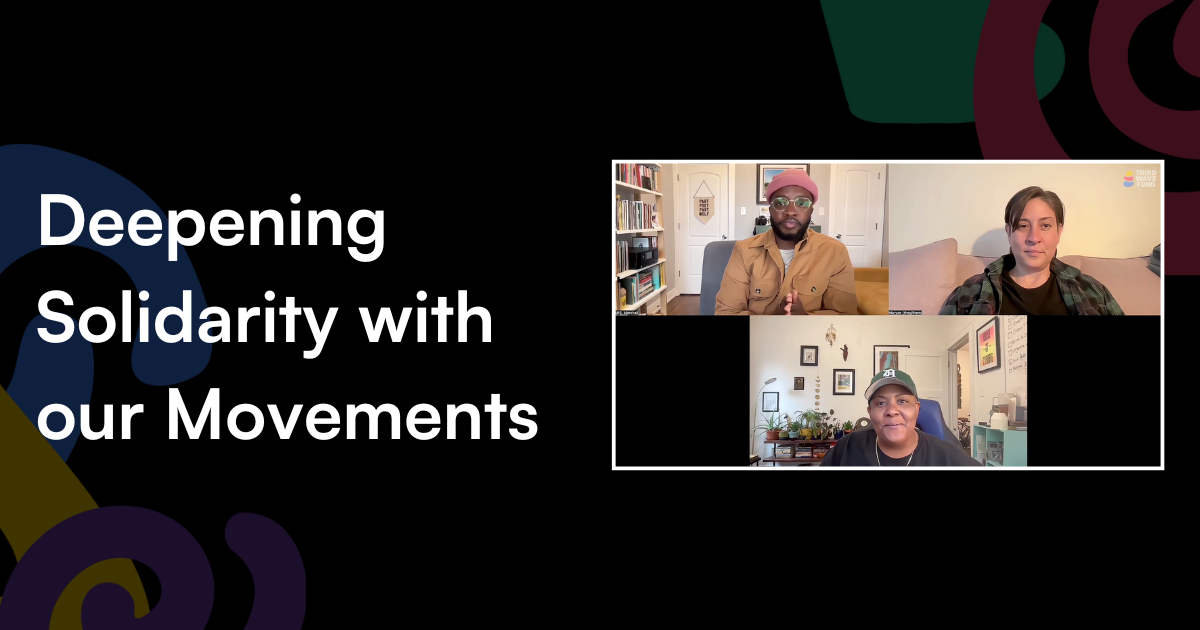The Time for Disability Justice is Now
Our largest movements are made up of small groups across the country resisting their material conditions. Whether in living rooms, Zoom rooms, churches, hospitals, DIY spaces, or schools – this is the work that bends the arc of the moral universe towards liberation. Under a fascism that has stepped well beyond our doorstep, we look towards organizations led by and for disabled communities who have historically resisted against systems of oppression, and shaped the very movements they’ve often been excluded from.
This moment should confirm what disabled communities have been raising for years: life-sustaining and affirming resources should be community-created and led. We have an opportunity as funders to include disability justice, not just disability rights, as a core funding priority with all of our work. We disabled folks exist in every community, within all the groups of people we work to uplift and support, and to move forward without intentional prioritization will only continue to deny our disabled communities the dignity and resources we deserve. The state is quickly escalating attacks on all people viewed as disposable. Because of this, our people are dying as life-affirming resources are defunded, dismantled, and banned faster than we’ve ever seen.
"We have an opportunity now to let go of any remaining beliefs that the state will keep our people safe. Instead, we must move our money quickly and without restrictions to the communities doing the work to keep us safe, resourced, and liberated." - Cory Lira & Nico Fonseca, Disability Frontlines Fund
For us at Disability Frontlines Fund (DFF), gender justice is rooted in the practice of creatively reimagining what we’ve been led to believe is the one and right way. Whether that’s the one and right way to have a body, to perform gender, to navigate and reclaim power, to practice care work, or to move together in collective and shared purpose. Disability Justice, like gender justice, asks us not just to question our material condition, but to practice creative and visionary remaking of our conditions while building new accessible futures rooted in community self-determination. Centering the leadership of those most impacted is a shared principle within gender and disability justice. Funders often have the propensity to create funding opportunities that are designed with the communities in mind, yet do so without long-term community involvement or leadership. We believe that we must work to counter that by creatively expanding our definitions of “resourcing” to meet the emergent needs of our grantee partners, fostering regular and consistent opportunities for prospective and current grantees to provide feedback, insight, and redirection as the needs of the field change or shift.
Disability Pride Month may be over, but we’re still sitting with all the lessons learned speaking with our DFF grantee partners over the course of July. We connected with three organizations – Autistic People of Color Fund, Long Covid Justice, and Liberating Purple Star Collective – about what they are resisting in their work, what they are building, and what they would like funders to know. You can check out these conversations below, on our blog, and on our Instagram page. You can also support the ongoing resourcing work of the Disability Frontlines Fund at Third Wave Fund by becoming a sustainer today.
Long Covid Justice
“We must keep fighting the ever-rising tides of fascism and eugenics. This means that masks & other COVID-protection strategies must be part of our justice movements, because COVID isn’t over, and more pandemics are on their way.” – Long Covid Justice.
Long Covid Justice is leading collective efforts to confront the Long COVID crisis, while centering racial, social, economic and disability justice. Their work is done by and for chronically ill and disabled people, families and communities. Their work centers BIPOC and LGBT communities, which often face disproportionate rates of COVID-19, Long COVID, and disability, along with the multiple impacts of pandemics past, present, and future. You can read our full interview with them here.
Autistic People of Color Fund
“We need funders to believe in, seek out, and support programs like ours on a long-term basis, especially as social safety nets are being defunded. Even before the current changes, these government programs often left most of our community behind due to inaccessibility, so we are constantly on the frontlines of protecting the lives of autistic POC like us. We need the support and resources to step in where our government has long since abandoned disabled POC.” – Autistic People of Color (APOC) Fund.
The Autistic People of Color Fund practices redistributive justice and mutual aid by returning and sharing money directly to and with autistic people of color. They provide microgrants to Black, Brown, Native, Asian, and multiracial people in the autistic community for survival, organizing, leisure, and pleasure. They are committed to the principles of Disability Justice, and their work is grounded in commitment to ending extractive economies and building and sustaining generative economies. You can read our full interview with them here.
Liberating Purple Star Collective
“Our existence as Deaf, Disabled, and Sick trans people is not an access issue—it’s a political issue. We are resisting systems that pathologize our bodies, treat our communication as ‘inconvenient,’ and label us as burdensome due to the need for interpreters, time, & accommodations. These systems criminalize our ways of navigating the world—when in fact, our ways are rooted in community, care, and survival.” – Najma Johnson, Liberating Purple Star Collective.
The Liberating Purple Star Collective is a trans-led, Deaf-centered nonprofit organization dedicated to empowering Deaf caregivers and their children, particularly those who are trans, non-binary, or gender-diverse. Their mission is to create inclusive, sustainable support systems that ensure families and their children are seen, validated, and empowered. They offer resources, mentorship, and advocacy services, both in-person in the DMV area and virtually nationwide, to bridge gaps in support for underserved communities. You can read our full interview with them here.


